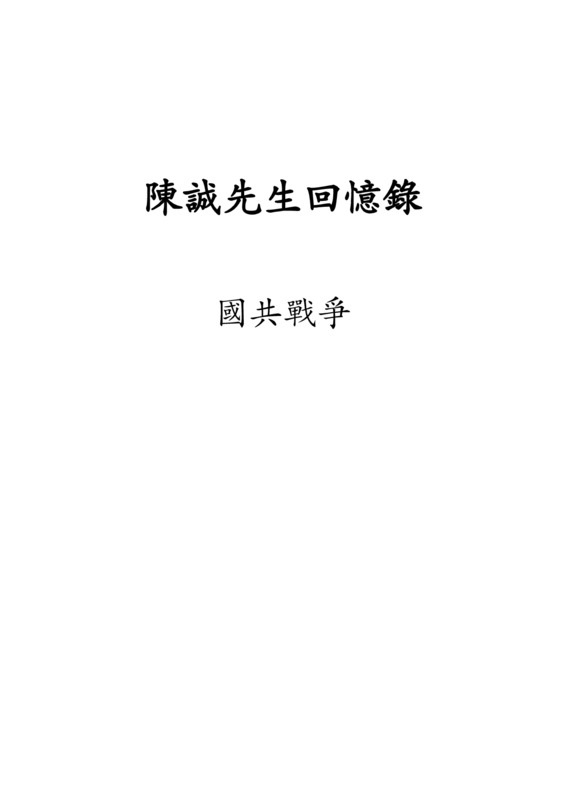Explore the collection
Showing 3 items in the collection
3 items
Book
Chen Cheng's Memoirs—The War between the Nationalists and Communists
Mr. Chen Cheng (courtesy name Cixiu; alias Shisou) served as the commander of the KMT army, commander-in-chief of the group army, commander-in-chief of the theater of operations, and chief of the general staff of the KMT. After the defeat of the Kuomintang army in Taiwan, Chen Cheng served the Administrative Yuan as Vice President of the Kuomintang. The volumes associated with *Chen Cheng's Memoirs* were published by Taiwan's National Museum of History in 2005. The series is divided into six volumes: *The Northern Expedition and the Chaos* (one volume), *The War between the Nationalists and Communists* (one volume), *The War of Resistance Against Japanese Aggression* (two volumes), and ***The Construction of Taiwan*** (two volumes). The first volume, *The War between the Nationalists and Communists* includes three parts: *Suppressing the Communists - Memories of the Military*, *Summary of Mr. Chen's Words and Actions*, and *Correspondence and Telegrams*. The book has original historical materials related to the five sieges and the counter-insurgency. In particular, this is the first time that important historical materials regarding the correspondence between Chiang Chung-cheng (courtesy name of Chiang Kai-shek) and Cixiu have been made public.
Periodicals
Examination of the Great Famine of the 1960s in China
This book documents the situation of people during the Great Famine, reflects on the causes of this tragedy, and candidly criticizes the practices of the time, which ignored the laws of the economy and put class struggle above all else. As a *de facto* party organ, Lanzhou Municipal Political Consultative Conference’s publication of this book bears special significance.
This book is the 22nd volume of a 23-volume series called the "Lanzhou Literary and Historical Materials" compiled by the Literary and Historical Materials and Study Committee of the Lanzhou Municipal Political Consultative Conference, a body directly under CCP control.
Taking Gansu, Qinghai and Henan Province as examples, the book describes the situation of people during the Great Famine and analyzes the causes of the disaster; it also documents a series of phenomena at that time, such as the irrational construction of mega hydraulic projects, the operation of communal canteens that caused huge waste, and the mass exodus of people fleeing the famine. In chapters 10 to 15, the book summarizes the lessons learned in detail, pointing out that the Anti-Rightist Campaign and the Great Leap Forward led to the tragedy of the Great Famine.
Published in 2002, the book was edited by Wu Wenjun Wang Jialuo. Wu Wenjun and Wang Jialuo also worked together on the 20th volume of the *Lanzhou Literary and Historical Materials*, *Examination of the Great Famine of the 1960s in Gansu Province* (which is also held by the archive). All but the 20th and 22nd series are available on the website ((https://www.gslzzx.gov.cn/col/col11760/index.html) ) of the Lanzhou Municipal Political Consultative Conference.
Periodicals
Examination of the Great Famine of the 1960s in Gansu Province
This book is a series of studies on the socio-economic situation in Gansu Province during the Great Famine of 1958 to 1961. The book is, divided into two parts.
The first part consists of five research articles, which document the miserable situation of the people of Gansu during the Great Famine. According to the book, the Gansu Provincial Party Committee admitted in a report that there were incidents of cannibalism in the area during the Great Famine. The articles also expose a series of activities by local authorities during the Great Leap Forward Campaign, such as the irrational construction of mega hydraulic projects, the false reporting of grain output, the operation of communal canteens that caused huge waste, and misleading the hungry people to eat bark and mud. The articles also analyze the reasons behind the disaster.
The second part of the book contains important historical documents reflecting the situation at that time, which are the evidence to support the author's research and analysis, including Gansu Provincial Party Committee's directives on the People's Commune, as well as a number of reports on the Committee’s work submitted to the Central Party Committee. In addition, the book contains news, propaganda posters and photographs published in newspapers at the time.
This book is the 20th series of the Lanzhou Literary and Historical Materials (there is a total 23 series) compiled by the Literary and Historical Materials and Study Committee of the Lanzhou Municipal Political Consultative Conference, an advisory body to the CCP (which is actually directly directed and supervised by CCP). This gives the book special value, as it reflects a semi-authoritative voice that supports independent historians' contention that the famine was far deeper and widespread than official historiography admits.
The book was published in 2002, written by Wu Wenjun and edited by Wang Jialuo. Wu Wenjun and Wang Jialuo also worked together on the 22nd series of the Lanzhou Literary and Historical Materials *Examination of the Great Famine of the 1960s in China* (which is also held by the archive). All but the 20th and 22nd series are available on the website of the Lanzhou Municipal Political Consultative Conference (https://www.gslzzx.gov.cn/col/col11760/index.html) .


